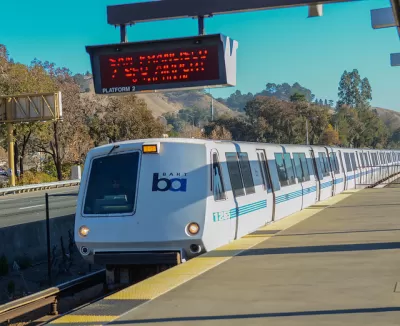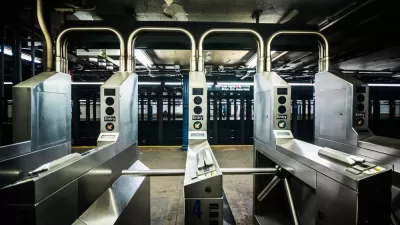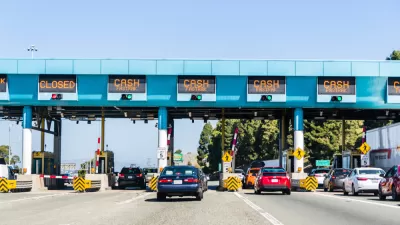The gas tax bill couldn't pass soon enough for the Bay Area's metro system. Service cuts and fare increases, scheduled for approval April 13, were greatly reduced due to an unexpected $16 million BART will receive, and the bill has yet to be signed!

"BART officials were set Thursday [April 13] to fill a looming multimillion-dollar budget gap in ways that would hurt many of its passengers," reports Michael Cabanatuan for the San Francisco Chronicle.
They would start trains an hour later in the morning, eliminate after-hours bus service and slash discounts for seniors, kids and riders with disabilities.
The service cuts and fare increases for the three above groups, scheduled to take effect January 1, 2018, resulted from "a projected $31 million deficit (that) BART blames on declining ridership — mostly on weekends — and a drop in sales tax revenue," adds Cabanatuan. In addition, the the new Warm Springs/South Fremont BART Station is also expected to add to the operating deficit (more on that below).
Unfortunately for BART riders, the across-the-board 2.7 percent fare increase, also scheduled for January 1, is unaffected by the bill's passage.
The partial relief, described below, was made possible on April 6 when 27 state senators, the bare minimum needed for a two-thirds supermajority, passed the extensive road and transit funding package, and then, even more remarkably, the Assembly followed suit, also with the minimum 54 votes to constitute a two-thirds supermajority [See both votes here].
As a result, "Sacramento would deliver an extra $16 million this year — enough to allow BART to pare its proposed budget cuts nearly in half," reports Cabanatuan.
That sent staff back to their spreadsheets. Seniors, people with disabilities, early risers and late workers or partyers would be spared from the budget cuts, but youths would have to pay higher fares, as would riders who continue to rely on BART’s familiar paper tickets with the magnetic stripe rather than switch to Clipper cards.
According to the governor's office, local public transit will receive $7.5 billion (14.3 percent) of the projected $52.4 billion over the next decade from the Road Repair and Accountability Act of 2017, and $1 billion (2 percent) will go to improve infrastructure that promotes walking and bicycling.
Extensions don't cover their operating costs
While BART’s declining ridership and sales tax revenue may contribute to the deficit, so do the opening of new extensions, said Nick Josefowitz, a BART director from San Francisco. Josefowitz said the opening of extensions to Warm Springs/South Fremont last month and, in spring 2018, of a diesel-rail line [eBART] in eastern Contra Costa County, are also driving the deficit.
Revenue from new passengers won’t cover the cost of staffing the new stations and trains, he said. He was unable to immediately provide dollar figures
Readers may recall that last November, voters in the three BART counties of San Francisco, Alameda and Contra Costa counties passed Measure RR, a $3.5 billion infrastructure bond measure, with 70.50 percent of the vote, well above the required two-thirds threshold. However, those bond revenues will go toward capital, not operational expenses.
A few final words on the significance of the Road Repair and Accountability Act of 2017. The last time the state legislature passed a gas tax increase was 1989 [see page 43 (pdf), almost 28 years ago, and that nine cents per gallon increase, without an inflation adjustment, was sent to the voters for approval in 1990. In addition, due to constitutional restrictions, most of the tax revenue went toward roads.
Lastly, the Road Repair and Accountability Act, unlike the 1989 legislation, increases the diesel excise tax by 20 cents per gallon, the diesel sales surtax by four percent, and adds a new vehicle licensing fee and zero emission vehicle fee. Gas and diesel taxes will increase on Nov. 1.
FULL STORY: BART spared tough budget decisions by last-minute state help

Alabama: Trump Terminates Settlements for Black Communities Harmed By Raw Sewage
Trump deemed the landmark civil rights agreement “illegal DEI and environmental justice policy.”

Study: Maui’s Plan to Convert Vacation Rentals to Long-Term Housing Could Cause Nearly $1 Billion Economic Loss
The plan would reduce visitor accommodation by 25% resulting in 1,900 jobs lost.

Planetizen Federal Action Tracker
A weekly monitor of how Trump’s orders and actions are impacting planners and planning in America.

Wind Energy on the Rise Despite Federal Policy Reversal
The Trump administration is revoking federal support for renewable energy, but demand for new projects continues unabated.

Passengers Flock to Caltrain After Electrification
The new electric trains are running faster and more reliably, leading to strong ridership growth on the Bay Area rail system.

Texas Churches Rally Behind ‘Yes in God’s Back Yard’ Legislation
Religious leaders want the state to reduce zoning regulations to streamline leasing church-owned land to housing developers.
Urban Design for Planners 1: Software Tools
This six-course series explores essential urban design concepts using open source software and equips planners with the tools they need to participate fully in the urban design process.
Planning for Universal Design
Learn the tools for implementing Universal Design in planning regulations.
Caltrans
Smith Gee Studio
Institute for Housing and Urban Development Studies (IHS)
City of Grandview
Harvard GSD Executive Education
Toledo-Lucas County Plan Commissions
Salt Lake City
NYU Wagner Graduate School of Public Service





























